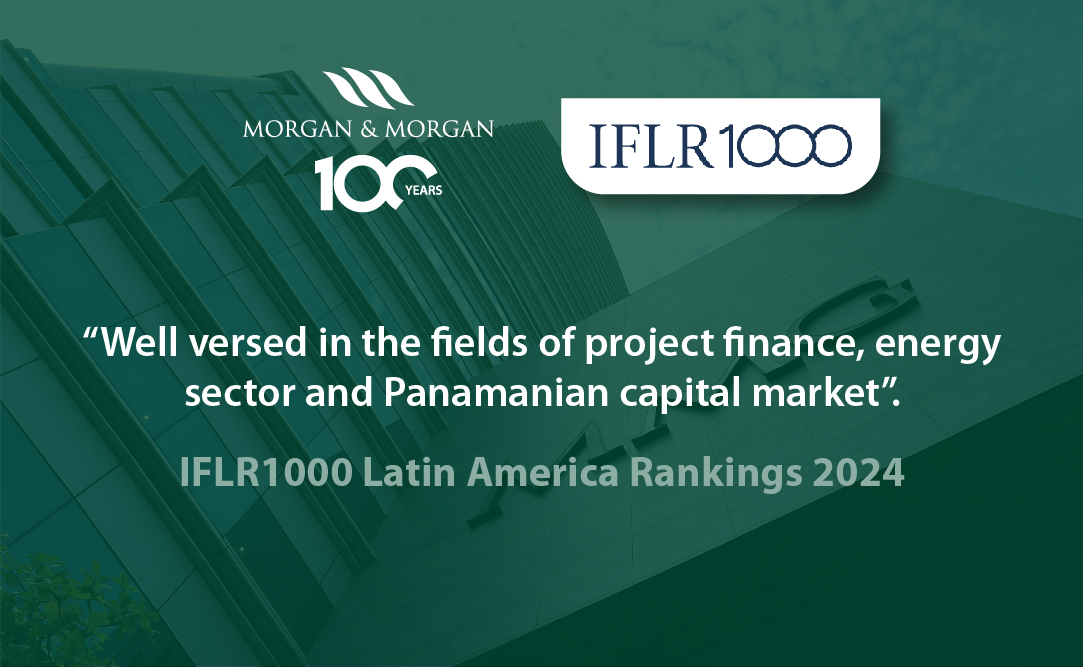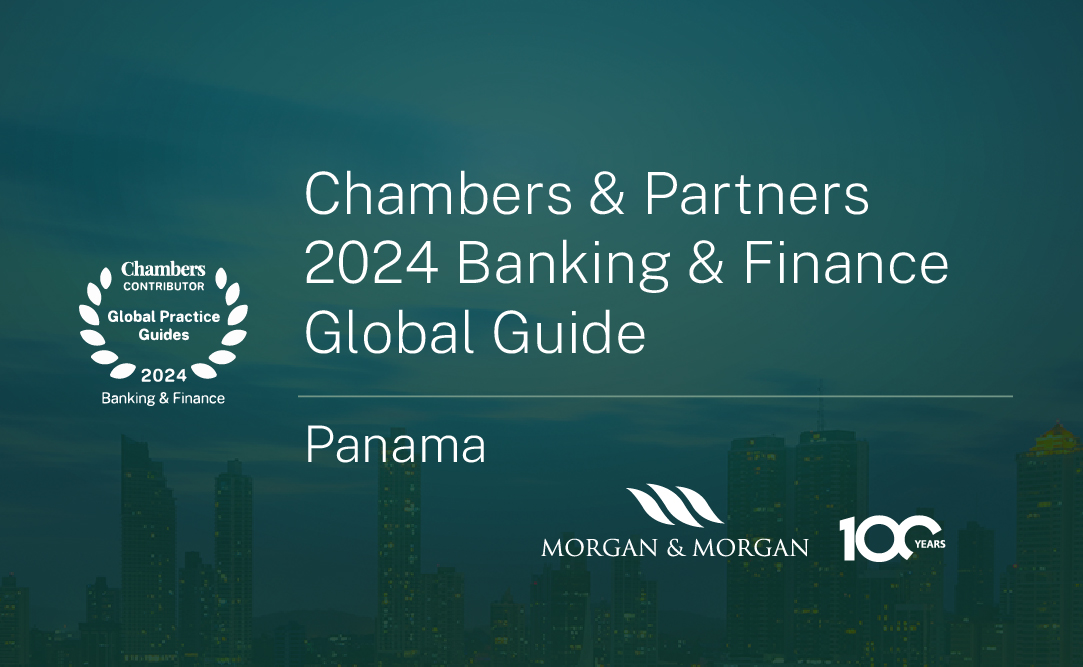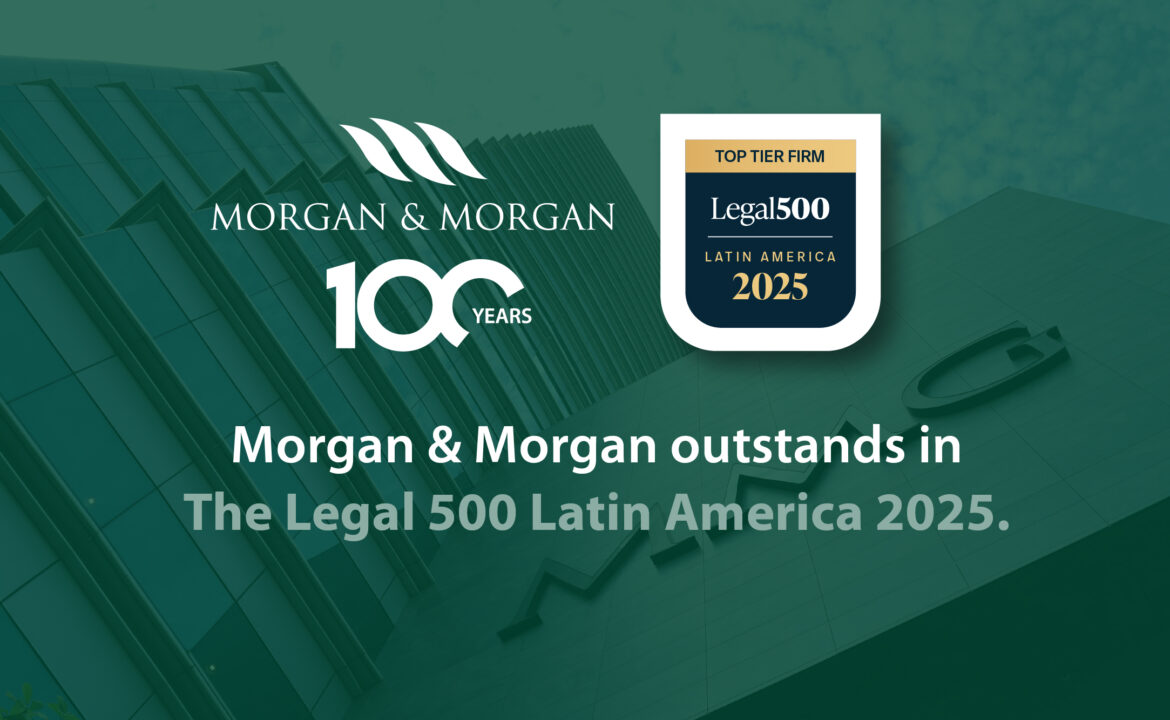Morgan & Morgan Ranked Among Top 10 Law Firms in Central America by Lexology Index 2025
Panama, June 10, 2025. Morgan & Morgan has once again been recognized as one of the top law firms in Central America, earning a place among the Top 10 firms in the Lexology Index Central America Report 2025 (formerly Who’s Who Legal). The firm also leads the Panama section with the highest number of individual recognitions for a Panamanian law firm. This
- Published in News, Albalira Montúfar, Allen Candanedo, Ana Castillo, Carlos Ernesto Gonzalez, Fanny Evans, Francisco Arias, Francisco Linares, Inocencio Galindo, Jazmina Rovi, Jose Carrizo, Juan David Morgan Jr, Kharla Aizpurua, Luis Manzanares, Luis Vallarino, Mayte Sanchez, Ramon Varela, Ricardo Aleman, Rishi Mungal, Rodrigo Arias, Simon Tejeira
Morgan & Morgan advised Banco Itaú Chile on significant refinancing of Grupo Decameron
Panama, January 30, 2025. Morgan & Morgan acted as Panamanian legal advisor to Banco Itaú Chile (formerly, Itaú Corpbanca), in its role as administrative agent, and to certain creditors, in their role as lenders, in connection with two credit facilities (one in Colombian Pesos and one in United States Dollars) granted by said lenders. These
Chambers FinTech Guide 2025
Panama, December 18, 2024. We are pleased to announce that Morgan & Morgan has been recognized as Band 1 in Chambers & Partners’ FinTech 2025 guide. In addition, two of our experts in this practice have been highlighted by the guide: Kharla Aizpurua O., Partner, Band 1 Roberto Vidal, Partner, Band 1 Chambers FinTech ranks
- Published in Kharla Aizpurua, News, Roberto Vidal
Morgan & Morgan receives top rankings in IFLR1000 – Latam 2024.
Panama, November 11, 2024. Once again, Morgan & Morgan consolidates its position as a leading law firm in Panama in the 2024 IFLR1000 Latam rankings. Banking and Finance: Tier 2 Capital Markets: Active M&A: Tier 2 Project Development: Tier 1 Individuals: Francisco Arias: Highly Regarded / Banking and Finance, Capital Markets, M&A, Project Development. Inocencio
Chambers & Partners 2024 Banking & Finance Global Guide
Panama, October 30, 2024. We are delighted to share our contribution to the Chambers & Partners 2024 Banking & Finance Global Guide. In the “Law and Practice” section, we provide an expert opinion on the financing market in Panama, delving into several critical aspects such as regulatory framework, ESG lending, guarantee vehicles, restrictions applicable to
- Published in Banking and Finance_news, Ariana V. Linares T., Kharla Aizpurua, Miguel Arias publi, News
Morgan & Morgan outstands in The Legal 500 Latin America 2025.
Panama, October 25, 2023. “Morgan & Morgan is a world-class law firm and, in addition to being the largest firm in Panama, has a group of terrific attorneys.” In number of ranked practices and individuals, Morgan & Morgan is Panama´s most recognized law firm in The Legal 500 Latin America 2025. With 40 individual rankings
- Published in News, Alejandro E. Chevalier, Allen Candanedo, Ana Castillo, Andres V. Mejía, Angelica Ortiz, Aristides Anguizola, Banking and Finance_news, Corporate Services_news, Energy and Natural Resources_news, Estate Planning_news, Fanny Evans, Francisco Arias, Francisco Linares, Inocencio Galindo, Intellectual Property_news, Jazmina Rovi, Jose Carrizo, Jose Rafael Reyes, Juan David Morgan Jr, Kharla Aizpurua, Labor Law_news, Laura Barrios, Litigation and Dispute Resolution, Luis Manzanares, Luis Miguel Hincapie, Luis Raven, Luis Vallarino, Maria Teresa Mendoza, Mayte Sanchez, Miguel Arias publi, Milagros Caballero, Nestor Broce, Orlando Tejeira, Ramon Varela, Raul Castro, Real Estate_news, Ricardo Aleman, Ricardo Arias, Roberto Lewis, Roberto Vidal, Securities and Capital Markets_news, Ship Finance and Registration_news, Shipping and Admiralty Litigation_news, Taxation_news
Morgan & Morgan advised Biocorp Holding, S.A. in the sale of Pharma Consulting Group, S.A. to Swixx BioPharma AG.
Panama, June 25, 2024. Morgan & Morgan served as legal advisors of Biocorp Holding, S.A. in a sequence of transactions culminating in the complete sale of Pharma Consulting Group, S.A. (“PCG”) to Swixx BioPharma AG. PCG is the parent company of Laboratorios Biopas, a prominent pharmaceutical company in Latin America, dedicated to the licensing, promotion,
Morgan & Morgan ranked among the top ten Central American law firms in Whos’s Who Legal 2024.
Panama, June 18, 2024. Once again, Morgan & Morgan stands out among the leading firms in Central America and leads the Panama section of Who´s Who Legal (WWL) 2024. The firm achieved 35 top individual rankings in 12 practice areas, the highest number for a Panamanian law firm. The 20 recommended attorneys are: Asset Recovery
- Published in News, Albalira Montúfar, Allen Candanedo, Ana Castillo, Carlos Ernesto Gonzalez, Francisco Arias, Francisco Linares, Inocencio Galindo, Jazmina Rovi, Jose Carrizo, Juan David Morgan Jr, Kharla Aizpurua, Luis Manzanares, Luis Vallarino, Maria Teresa Mendoza, Mayte Sanchez, Ricardo Arias, Rishi Mungal, Roberto Lewis, Rodrigo Arias, Simon Tejeira
ICLG Lending & Secured Finance 2024: Panama Chapter.
Panama, May 30, 2024. Kharla Aizpurua Olmos, partner and cohead of Morgan & Morgan´s Banking & Finance practice team, contributed to the Panama chapter of the ICLG Lending & Secured Finance 2024. The guide covers common issues in lending and secured finance laws and regulations, including guarantees, collateral security, financial assistance, syndicated lending, and LIBOR
- Published in Banking and Finance_news, Kharla Aizpurua, News
Chambers & Partners 2024 Fintech Global Guide
Panama, April 29, 2024. Morgan & Morgan´s Telecommunications, Technology & Data Protection team, comprised of partners Kharla Aizpurua Olmos and Roberto Vidal, and associates Alejandro Vasquez Vallarino and Miguel Arias, contributed to the Panama Chapter of Chambers & Partners 2024 Fintech Global Guide. The guide includes the “Law and Practice” section, which provides a valuable analysis on fintech policies, business
- Published in News, Alejandro Vasquez Vallarino, Kharla Aizpurua, Miguel Arias publi, Roberto Vidal










